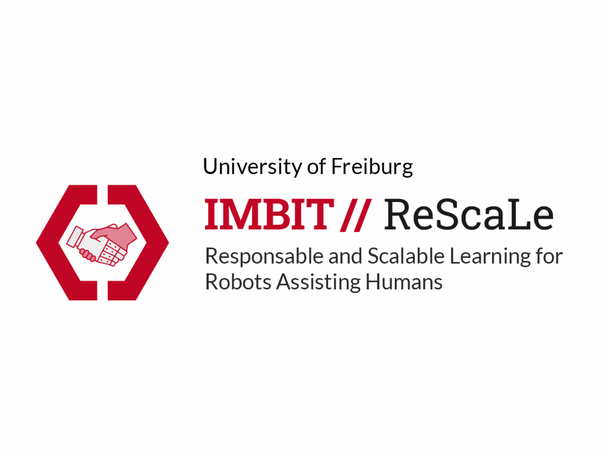
The new collaboration project ReScaLe optimizes learning processes of robots, taking into account social, ethical and legal aspects
Freiburg, 09.11.2021
The Carl Zeiss Foundation is funding the collaboration project "Responsible and Scalable Learning for Robots Assisting Humans" (ReScaLe) at the University of Freiburg as part of its "Scientific Breakthroughs in Artificial Intelligence" program. The consortium is researching new methods to improve learning processes of robots - with the aim of enabling humans and robots to work even more closely together in the future. To this end, ReScaLe will receive five million euros over the next six years; scientists from six disciplines are involved in the project.
The project is headed by Prof. Dr. Wolfram Burgard, spokesperson of the BrainLinks-BrainTools center and head of the Autonomous Intelligent Systems group at the Institute of Computer Science at the University of Freiburg. "We are very pleased that our concept 'Responsible and Scalable Learning for Robots Assisting Humans' has been selected. The Carl Zeiss Foundation grant will strengthen our research on AI-based robots and help drive progress toward autonomous and adaptable service robots that can be used in home environments," Burgard says.
AI-based robots are expected to support numerous tasks in our society
AI-based robots are expected to support numerous tasks in our society, for example by assisting people in everyday life or making production processes more efficient - however, despite rapid advances in research, they are not yet part of our everyday lives. In order to make them more integrable for everyday life, ReScaLe will on the one hand work on the still existing technical challenges in the field of machine learning. On the other hand, the project will also consider social, ethical and legal aspects in order to strengthen trust in these systems.
Robots to learn tasks from humans by being demonstrated to them
Innovative machine learning methods will enable ReScaLe robots to learn tasks from humans by demonstrating them to them. To enable robots to efficiently perform the learning task, ReScaLe is developing new approaches to minimize the number of demonstrations required. The research project will introduce novel unsupervised and self-supervised deep learning methods that require only a small amount of annotated data. Further innovative methods will also support deep learning in dealing with uncertainties to further improve data efficiency.ReScaLe will simultaneously pave the way for responsible AI and robotics applications based on human rights, taking an integrated multi-level approach that considers ethical-legal normative requirements in conjunction with risks to core rights and interests, as well as user*oriented design requirements. Specially tailored participatory outreach activities accompany the project to promote community acceptance and enable bidirectional communication with researchers.
Researchers from the fields of computer science, ethics, human-machine interaction, law, mathematics and robotics are participating in ReScaLe. The project strengthens the profile field "Data Analysis and Artificial Intelligence" of the University of Freiburg and will be located in the research building 'Intelligent Machine-Brain Interfacing Technology' (IMBIT).
About the Carl Zeiss Foundation
The Carl Zeiss Foundation has set itself the goal of creating scope for scientific breakthroughs. As a partner of excellent science, it supports both basic research and application-oriented research and teaching in the MINT disciplines (mathematics, computer science, natural sciences and technology). Founded in 1889 by the physicist and mathematician Ernst Abbe, the Carl Zeiss Foundation is the oldest private science-funding foundation in Germany. It is the sole owner of Carl Zeiss AG and SCHOTT AG. Its projects are financed from the dividend distributions of the two foundation companies.
Link to the original press release of the University of Freiburg